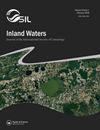季节和景观对池塘水质的影响
IF 2.3
3区 环境科学与生态学
Q1 LIMNOLOGY
引用次数: 1
摘要
摘要了解池塘生态系统中土地利用/土地覆盖与物理化学水质之间的空间关系,对池塘的保护和管理至关重要。这些知识对于协调景观规划和管理尤其重要,尤其是在人口快速增长的城市地区。在这项研究中,我们测量了(1)水质的季节性差异和(2)周围景观在4个空间尺度上的影响(10 m、 100 m、 500 m、 和全流域)对新西兰奥克兰地区50个池塘水质的影响。对于每个池塘,在冬季和夏季测量了9个物理化学水质变量和9个景观特性(LULC和池塘的物理特征)。我们发现,在夏季,电导率、总溶解固体、饱和溶解氧百分比(%DO)、pH、盐度和磷酸盐浓度的测量值明显更高。相比之下,冬季氨氮浓度较高。这些发现表明夏季水质受损。多元线性回归和冗余分析表明,在不同的空间尺度和季节,LULC和物理景观特征对物理化学变量的影响不同。所有4个空间尺度的景观特性仅在夏季才是池塘温度和%DO的良好指标。总的来说,在集水区和500 冬季和100米 m级。这项研究强调了在量化土地与水的相互作用时,包括不同空间尺度、季节和景观的重要性。本文章由计算机程序翻译,如有差异,请以英文原文为准。
The influence of season and landscape on the water quality of ponds at multiple spatial scales
ABSTRACT Understanding the spatial relationships between land use/land cover (LULC) and physicochemical water quality in pond ecosystems is vital to the conservation and management of ponds. This knowledge is especially critical to reconcile landscape planning and management, particularly in urban regions with rapid population growth. In this study we measured (1) seasonal differences in water quality and (2) the impact of the surrounding landscape at 4 spatial scales (10 m, 100 m, 500 m, and full catchment) on water quality of 50 ponds in the Auckland region, New Zealand. For each pond, 9 physicochemical water quality variables and 9 landscape properties (LULC and physical features of the ponds) were measured in winter and summer. We found significantly higher measures of conductivity, total dissolved solids, percentage of dissolved oxygen at saturation (%DO), pH, salinity, and phosphate concentrations in summer. By contrast, ammoniacal nitrogen concentration was higher in winter. These findings indicated impaired water quality during summer. Multiple linear regression and redundancy analyses showed that LULC and physical landscape features had different influences on the physicochemical variables across the different spatial scales and seasons. The landscape properties at all 4 spatial scales were good indicators of pond temperature and %DO only in summer. Overall, variations in pond water quality were explained better by general landscape characteristics than by LULC alone at the catchment and 500 m scale in winter and at the 100 m scale in summer. This study highlights the importance of including different spatial scales, seasons, and landscapes when quantifying land–water interactions.
求助全文
通过发布文献求助,成功后即可免费获取论文全文。
去求助
来源期刊

Inland Waters
LIMNOLOGY-MARINE & FRESHWATER BIOLOGY
CiteScore
6.10
自引率
9.70%
发文量
34
审稿时长
>12 weeks
期刊介绍:
Inland Waters is the peer-reviewed, scholarly outlet for original papers that advance science within the framework of the International Society of Limnology (SIL). The journal promotes understanding of inland aquatic ecosystems and their management. Subject matter parallels the content of SIL Congresses, and submissions based on presentations are encouraged.
All aspects of physical, chemical, and biological limnology are appropriate, as are papers on applied and regional limnology. The journal also aims to publish articles resulting from plenary lectures presented at SIL Congresses and occasional synthesis articles, as well as issues dedicated to a particular theme, specific water body, or aquatic ecosystem in a geographical area. Publication in the journal is not restricted to SIL members.
 求助内容:
求助内容: 应助结果提醒方式:
应助结果提醒方式:


